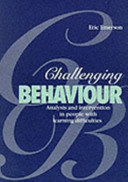
Challenging Behaviour
By - Emerson, Eric, 1953-
Floor
-
Floor 1
ISBN 10 - 052140665X
ISBN 13 - 9780521406659
Book Status
-
1 Qnty Available with us.
Shelf No
-
19
Call Number
-
362.27 EME
Physical Description
-
x, 233 p.
Notes
-
Includes index